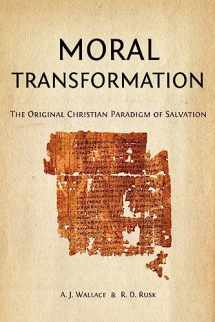
Moral Transformation: The Original Christian Paradigm of Salvation
Book details
Summary
Description
Recent scholarship has challenged post-Reformation ideas about the early Christian doctrines of salvation. This ground-breaking book draws together the conclusions of recent scholarship into a compelling and clear view of the early Christian paradigm of salvation. It presents the case that the early Christians focussed not on Christ’s death on the cross or ‘saving faith’, but on moral transformation. They saw Jesus as God’s appointed teacher, prophet, and leader, who died as a martyr in order to teach them a new way of life. Their paradigm of salvation centred upon this way of life taught by Jesus, and on following faithfully his example and teachings. Part 1: 'How the Gospels present Jesus' explores the way in which the early Christians understood the teaching of Jesus. It highlights five themes of Jesus’ message: economics and wealth, moral purity, social equality, the temple system, and physical and spiritual affliction. It shows why people viewed Jesus as a divinely appointed teacher, prophet, and leader, and saw his death as a martyrdom for his cause and movement. Part 2: 'Doctrines of the early Christians' presents the key early Christian doctrines of salvation and shows why several post-Reformation doctrines conflict with their views. It shows that the early Christians believed God’s final judgment is made on the basis of character and conduct. They believed that by following Jesus and transforming their lives morally, they would obtain positive judgment and resurrection. This part shows how the early Christians’ ideas of faith, justification, forgiveness and grace all fit into this paradigm. Part 3: 'The importance of Jesus' looks at why the early Christians considered Jesus so significant; they focussed on the moral transformation he brought to their lives. This part highlights what they believed Jesus achieved for them, and how they used sacrificial language to explain these beliefs. It explores the evidence for viewing Jesus’ death as a martyrdom, and for seeing his resurrection as equally important. Part 4: 'Ideas throughout history' shows that Christians held this paradigm of salvation for several centuries. It outlines the key changes that occurred from the 4th century through to the Reformation, which moved tradition away from the early Christian ideas. Finally, it offers a critique of modern post-Reformation doctrines of salvation.


We would LOVE it if you could help us and other readers by reviewing the book
Book review



